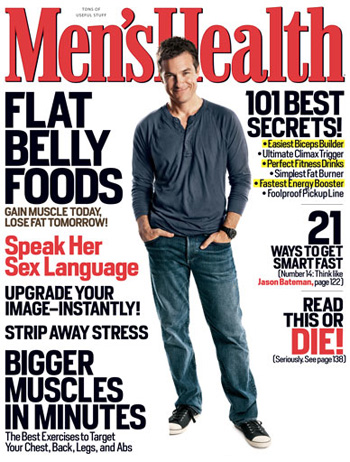I didn’t get to take a massage with actor Jason Bateman, but the neighbor of our friends did, so that’s how I came to read an interview with the child actor turned adult funny man in Men’s Health.

Besides feeling a degree of connection to the writer, I was intrigued by a headline that says “A man learns a thing or two when life tosses him a do-over.” Hmm, sounds like a reinvention narrative, yes?
Jason Bateman shouldn’t be here. I don’t mean here at this spa, but here — in our movie theaters and on our TVs. We watched him grow up (Little House on the Prairie, Silver Spoons, The Hogan Family), and then washed our hands of him. By the normal narrative of his industry, he should be, perpetually, a cherubic face on TV Land, or a reality-show contestant selling the last bit of his soul. But Bateman is here; his comeback is official and no longer news. FOX’s late, great Arrested Development — a showcase for Bateman’s recise comic timing and dry wit — reanimated him like a dormant monster in a Shelley novel. The Golden Globe didn’t hurt, either. His staying power is what he’s most proud of–that he’s still here after nearly three decades (a couple of centuries in actor years). Along the way he’s learned a thing or two about a thing or two.
The story is sort of a Jason Bateman five-point plan to a comeback — he speaks to overcoming his party boy lifestyle and getting his priorities straight. Among the many good insights was this:
“I’ve been fortunate, but I’m also not very precious about making sure I’m the star of a film,” he says. “If it’s a good part in a good movie, I’ll do it.” Good part, good movie is different from big part, big movie. Bateman’s role in State of Play, for instance, clocks maybe 15 minutes. But it’s a juicy 15, in which he trades dramatic haymakers with Russell Crowe. Choices like that allow Bateman to work with first-rate people while expanding his versatility. He’s been hot before, and he knows what can happen when you aren’t careful with your name (in his case, death by Teen Wolf Too). So this time he’s not picking any low-hanging fruit. “My goal is to get another 30 years out of this business,” he says. “So I need to figure out the fuel to do that. And so far, I think it’s respect and quality and company, not celebrity or box office or stardom.”
In an industry that’s all about ego, Bateman instead is succeeding by making choices about the opportunity to learn and to work with talented colleagues. There’s also an element there of seeing his career as a marathon, where slow and steady wins the race, instead of a sprint, just trying to cash in big as fast as possible.
I already liked Bateman — Arrested Development is one of the few sitcoms I’ve gotten consistent laughs from — but this article got me really jealous that I wasn’t the one getting to hang out with him and learn from his life experiences.
What choices have you made to build your long-term happiness? Are there times when you can or should put your ego aside to do what’s actually best for you?

